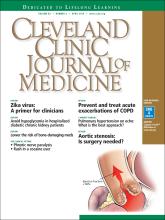ABSTRACT
Acute exacerbations of chronic obstructive pulmonary disease (COPD)—characterized by shortness of breath, increased sputum production, increased purulence, or a combination of these signs—are costly and can have major impacts on the patient’s health. Corticosteroids, antibiotics, and bronchodilators are the cornerstones of prevention and therapy, with mucolytics, oxygen supplementation, and ventilatory support also advisable for some patients. Treatment should be evidence-based and tailored to the patient’s history and present needs.
Footnotes
Dr. Hatipoglu is the recipient of an investigator-initiated research protocol grant from Novartis and has received honoraria for speaking engagements from Forest Laboratories.
- Copyright © 2016 The Cleveland Clinic Foundation. All Rights Reserved.
- Umur S. Hatipoglu, MD⇑
- ADDRESS:
Umur S. Hatipoglu, MD, Respiratory Institute, A90, Cleveland Clinic, 9500 Euclid Avenue, Cleveland, OH 44195; hatipou{at}ccf.org
- Loutfi S. Aboussouan, MD
ABSTRACT
Acute exacerbations of chronic obstructive pulmonary disease (COPD)—characterized by shortness of breath, increased sputum production, increased purulence, or a combination of these signs—are costly and can have major impacts on the patient’s health. Corticosteroids, antibiotics, and bronchodilators are the cornerstones of prevention and therapy, with mucolytics, oxygen supplementation, and ventilatory support also advisable for some patients. Treatment should be evidence-based and tailored to the patient’s history and present needs.
Footnotes
Dr. Hatipoglu is the recipient of an investigator-initiated research protocol grant from Novartis and has received honoraria for speaking engagements from Forest Laboratories.
- Copyright © 2016 The Cleveland Clinic Foundation. All Rights Reserved.






